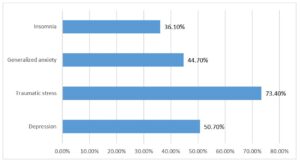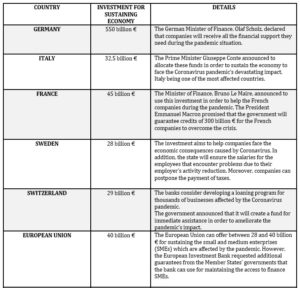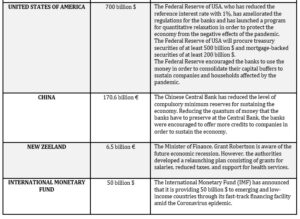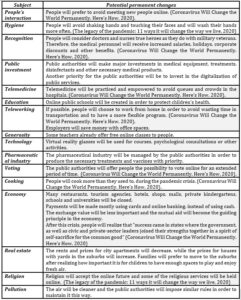Introduction
Since the Coronavirus debut, the situation all over the world has been negatively influenced from psychological, social and economic perspectives. People are seriously affected by the preventive rules they have to obey in order to avoid the spreading of the virus. Moreover, the global economy has suffered a severe shock and, according to the specialists, the predicted future will not be brighter.
Although in the last years, science has rapidly advanced in all fields of activity, the new virus exceeded the world’s power to control its evolution and unfavourable effects.
An innocent Chinese bat managed to radically change the earth’s vibration into one generated by a terrible war. Therefore, people realized that nature will always set limits for humanity. In addition, the pandemic indicated the unknown weaknesses of the public system and the need for making more correct investment decisions.
Consequently, due to the Coronavirus pandemic, people will experience a completely different life, to which they will have to adapt, in a world based on unusual rules to respect in order to survive.
Literature Review
The World Health Organization (WHO) declared, on the 30th of January 2020, the epidemic of coronavirus a Public Health Emergency of an International Concern. It all started from four patients that were workers in Wuhan seafood market who used to deal with some wild animals. The idea that COVID-19 was sheltered by a bat came from the fact that it contains 96% of its genome level –. (Fang et al., 2020)
As a response to this COVID – 19 outbreak, the Chinese government took protective measures such as: “early detection, early isolation, early treatment, adequate medical supplies, patients being admitted to designated hospitals, and a comprehensive therapeutic strategy” (Fang et al., 2020).
In China, these measures have reduced the number of new cases of Coronavirus with 90%. However, the public protective measures did not work in all the affected countries. Italy was particularly affected. It is imperative for all the health systems to be prepared with proper medical equipment and treatments. (Remuzzi, A. & Remuzzi, G., 2020)
However, there are many cases of countries that suffer from lack of preparedness. In one study entitled Straining the System: Novel Coronavirus (COVID-19) and Preparedness for Concomitant Disasters, two American authors; Nathaniel Smith and Michael Fraser, stated that “Advancing world-class data and analytics to support public health decision-making is vital to our disease surveillance and response activities.” They also blame the system in The United States for using old technologies, such as: faxes, to report information about the public health and use paper forms to follow up. Paper is still used to record important health data and spreadsheets are completed manually. Considering the unbalanced state of the technological evolution, the public health data system urgently needs a modernization (Smith & Fraser, 2020).
In the United States, after the terrorist attacks of September 11, 2001, significant investments were made to increase the level of public health preparedness. In addition, in 2018, the authorities created a special Reserve Fund for the public health system during epidemics and other kinds of emergencies. Nonetheless, the budget established for public health has been diminished from 2002 to 2019 by approximately one third. The American authors sustain that increasing the budget for public health to the level from 2002 should be a priority for the authorities, considering threats like COVID-19 (Smith & Fraser, 2020).
In fact, the pandemic situation affects many sectors beside public health systems and the medical care field. It also generates social and economic vulnerabilities especially in cities with high population density. Consequently, specialists in managing urban data can have an important contribution to better prevent different similar viruses. In this perspective, urban intelligence can bring value through means of continuous risk assessment and assisting the economic recovery. Therefore, to properly cope with this pandemic, it is necessary to invest in applying the best practices in urban intelligence.
The problem of a possible pandemic situation was predicted by Bill Gates and other disease and flu experts. Bill Gates warned the public authorities that they should invest in the pandemics’ preparedness. Furthermore a former official from the White House also sustained the idea of an upcoming pandemic threat. (Hoffower, 2020)
Regarding the question about the end of the COVID-19 pandemic situation, scientists from Singapore University of Technology and Design (SUTD) attempted to discover the answer by using a mathematical model. They predicted that the end will be in December. However, this date will differ from one nation to another depending on the start date of the pandemic. (Macaulay, 2020)
From a psychological perspective, the pandemic situation of COVID-19 has been undoubtedly affecting people all over the world. In a survey of people at higher risk of being infected with Coronavirus, the rates of depression, traumatic stress, generalized anxiety and insomnia reached alarming levels (Liu et al., 2020). The following Figure 1 illustrates them:

Figure 1: Results of a survey on the psychological impact of the pandemic
Source: based on information from (Liu et al., 2020)
These results are quite shocking, however, if they are compared with previous research materials on the psychological impact of other similar outbreaks, it has been demonstrated that fear related to being infected is connected with anxiety, post-traumatic stress and suicidality (Sherman, 2020; Chong et al., 2004; Wheaton et al., 2012; Wu et al., 2009; Yip et al., 2010).
Another correlation discovered in the study is the higher level of coronavirus anxiety that people of younger age and higher education levels tend to have (Sherman, 2020).
Furthermore, in 2003, during SARS epidemic, there was a positive connection between the virus related anxiety and the aversion to Chinese people, food and products (Sherman, 2020; Keil & Ali, 2006).
Covid-19 has created a massive panic world-wide and it has been compared with an “angel of death, a relentless and soulless invader that has infected the global psyche with fear and the bodies of our most vulnerable citizens” (Polizzi et al., 2020).
The pandemic managed to affect every aspect of people’s lives such as: the way people earn their living, how they communicate with other people, the way they spend their spare time and other similar aspects. People are permanently concerned about the future, whether they and their families and friends will survive the virus. None of the previous pandemics created such prolonged perturbations as Covid-19 did. (Polizzi et al., 2020)
From an economic point of view, the negative impact of COVID-19 has started to be increasingly visible. People store stocks of food, hand sanitizers and other necessary products. Considering that schools are closed, some parents give up work to stay home with their children. Other families are worrying about what their children will eat. Universities were closed, meanwhile the authorities imposed travel restrictions and some students have been stranded. Weddings and other similar events were all canceled. (Science in the time of coronavirus, 2020)
All these changes result in financial losses for people and their countries. Some of the most powerful countries in the world have announced their intention to develop investments of thousands of billions for sustaining the economy as the global production cannot be stopped and money needs to circulate regardless the COVID-19 global crisis’ level of severity. Any hesitation in this way would cause incalculable consequences. Therefore, the powerful countries’ governments declared from the beginning of the pandemic that they will implement immediate measures to sustain the economy. (The big states are fighting coronavirus with colossal investments in the economy. Romania is calm and analyses, 2020)
The next Table 1 illustrates the numbers associated with these investments and some related details:
Table 1: Investments for sustaining economy


Source: based on the information from (PROTVNews, 2020;)
Based on the information provided by Eurostat, during the first quarter of 2020, the Gross Domestic Product (GDP) decreased by 3, 5% in the European Union, compared with the previous quarter, while the GDP diminished with 2, 7% in the first quarter of 2020, compared with the first quarter of 2019.
It can be observed that the negative difference of the GDP growth due to the Coronavirus pandemic is significantly high but not higher than the one recorded in 2008.
According to the Bureau of Economic Analysis (BEA) estimates, the United States’ GDP growth decreased by 4, 8% in the first quarter of 2020 in comparison with the previous quarter.
In conclusion, the global economy will record high financial losses due to the COVID-19 pandemic situation.
However, the world succeeded to pass through similar situations by analyzing all the pandemic’s effects and identifying efficient solutions to cope with them.
Most of the public authorities world-wide implemented the correct measures to cope with the pandemic situation from a socio-economic perspective.
The next chapter highlights the most important changes brought by COVID-19, changes that the world has to accept and to adapt to them. Therefore, the world has to adapt to the new directions imposed by COVID-19, directions that reveal the new “normality”.
Potential irreversible changes after COVID-19
It is a well-known fact that the world has the capacity to overcome COVID-19 as in the past, as the economy managed to rebound after similar crisis.
The novelty of the current pandemic is represented by several potential changes that the world might have to accept. People are waiting to return to their lives before COVID-19 appeared. Unfortunately, this is not likely to happen because the pandemic situation imposed changes that will influence the world’s evolution.
The next Table 2 displays some of the mentioned changes predicted by thinkers, experts and scientists:
Table 2: Potential changes after COVID -19

Sources: based on the information from (Coronavirus Will Change the World Permanently. Here’s How, 2020; The legacy of the pandemic: 11 ways it will change the way we live, 2020)
Some of these changes might not happen, but the world has to accept that this is the time for a radical change being so vulnerable in front of a very little virus.
Conclusions
The present Coronavirus pandemic has caused over 3,2 million deaths and has seriously affected people’s lives from psychological, social and economic perspectives.
Nevertheless, the world will successfully overcome the COVID-19 pandemic and will find the proper methods to adapt to the new reality.
Moreover, people have to learn the lessons offered by this pandemic, appreciate health and hope for a better world in which the guiding principle is the life’s protection.
Public authorities, people, private companies and NGO’s have to form a capable team that can win the war against climate changes, nature hazards and new viruses. In addition to that, people should remember to resist human weaknesses as greed, arrogance, vanity and egoism.
Acknowledgement
The present article was also presented at the 35th IBIMA Conference Seville, Spain through virtual presentation. The article was entitled “COVID-19 pandemic – a permanent socio-economic change?” (Manta, 2020) and included a different Abstract and Introduction.
(adsbygoogle = window.adsbygoogle || []).push({});
References
- Bureau of Economic Analysis. (2020, April 29) Gross Domestic Product, 1st Quarter 2020 (Advance Estimate).[Online], [Retrieved May 3, 2020] https://www.bea.gov/news/2020/gross-domestic-product-1st-quarter-2020-advance-estimate
- Chong, M., Wang, W., Hsieh, W., Lee, C., Chiu, N., Yeh, W., Huang, T., Wen, J., & Chen, C. (2004). Psychological impact of severe acute respiratory syndrome on health workers in a tertiary hospital. British Journal of Psychiatry, 185(2), 127–133. https://doi.org/10.1192/bjp. 185.2.127
- Coronavirus Will Change the World Permanently. Here’s How. (2020, March 19). Politico Magazine.
- [Online], [Retrieved May 3, 2020]https://www.politico.com/news/magazine/2020/03/19/coronavirus-effect-economy-life-society-analysis-covid-135579
- (2020, April 30). Preliminary flash estimate for the first quarter of 2020. [Online], [Retrieved May 3, 2020], https://ec.europa.eu/eurostat/documents/2995521/10294708/2-30042020-BP-EN.pdf/526405c5-289c-30f5-068a-d907b7d663e6
- Fang, Y., Nie, Y., & Penny, M. (2020). Transmission dynamics of the COVID‐19 outbreak and effectiveness of government interventions: A data‐driven analysis.Journal of Medical Virology, 92(6), 645-659. https://doi.org/10.1002/jmv.25750
- Hoffower, H. (2020, April 10). Bill Gates has been warning of a global health threat for years. Here are 11 people who seemingly predicted the coronavirus pandemic. Business Insider.[Online], [Retrieved May 3, 2020], https://www.businessinsider.com/
- Keil, R., & Ali, H. (2006). Multiculturalism, racism and infectious disease in the global city: The experience of the 2003 SARS Outbreak in Toronto. Topia: Canadian Journal of Cultural Studies, 16, 23 –49. https://doi.org/10. 3138/topia.16.23
- The legacy of the pandemic: 11 ways it will change the way we live. (2020, April 22) Part of the Pandemic Issue of The Highlight by Vox.[Online], [Retrieved May 3, 2020],https://www.vox.com/the-highlight/2020/4/16/21213635/coronavirus-covid-19-pandemic-legacy-quarantine-state-of-mind-frugality
- Lai, Y., Yeung, W., Celi, L.A. (2020). Urban Intelligence for Pandemic Response: Viewpoint. JMIR Public Health Surveill,6(2), e18873. doi:10.2196/18873
- Liu S., Yang L., Zhang C., Xiang Y., Liu Z., Hu S., Zhang B.(2020). Online mental health services in China during the COVID-19 outbreak. Lancet Psychiatry. 2020;7. [Online], [Retrieved May 3, 2020] doi: 10.1016/S2215-0366(20)30077-8
- Macaulay, T. (2020, April 29). AI model predicts the coronavirus pandemic will end in December.[Online], [Retrieved May 3, 2020], https://thenextweb.com/neural/2020/04/29/ai-model-predicts-the-coronavirus-pandemic-will-end-in-december/
- Manta, A.-M. (2020). COVID-19 pandemic – a permanent socio-economic change?.International Business Information Management Conference (35th IBIMA) Seville, Spain. proceedings (ISBN: 978-0-9998551-4-0)
- Polizzi, C., Lynn, S.J., Perry,A. (2020). Stress and Coping in the Time of COVID-19: Pathways to Resilience and Recovery. Clinical Neuropsychiatry, 17 (2), 59-62. https://doi.org/10.36131/ CN20200204
- (2020). The big states are fighting coronavirus with colossal investments in the economy. Romania is calm and analyses. [Online], [Retrieved May 3, 2020], https://stirileprotv.ro/stiri/financiar/marile-state-combat-coronavirusul-cu-investitii-colosale-in-economie-romania-e-calma-si-analizeaza.html
- Remuzzi, A., & Remuzzi, G. (2020). COVID-19 and Italy: what next?. The Lancet, 395(10231), 1225-1228. https://doi.org/10.1016/S0140-6736(20)30627-9
- Science in the time of coronavirus.(2020). Nature Methods 17, 355. https://doi.org/10.1038/s41592-020-0807-y
- Sherman A. L. (2020). Coronavirus Anxiety Scale: A brief mental health screener for COVID-19 related anxiety, Death Studies, DOI: 10.1080/07481187.2020.1748481
- Smith, N.,&Fraser, M.(2020).Straining the System: Novel Coronavirus (COVID-19) and Preparedness for Concomitant Disasters. American Journal of Public Health,110(5), 648-649. https://doi.org/10.2105/AJPH.2020.305618
- The big states are fighting coronavirus with colossal investments in the economy. Romania is calm and analyses. [Online], [Retrieved May 3, 2020], https://stirileprotv.ro/stiri/financiar/marile-state-combat-coronavirusul-cu-investitii-colosale-in-economie-romania-e-calma-si-analizeaza.html






